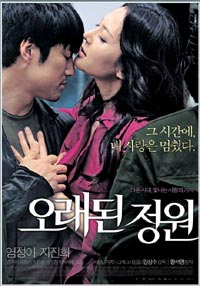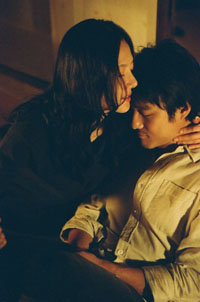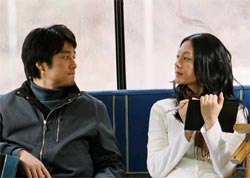The Old Garden (2006, Dir. Im Sang-Soo):
“Life is long, history is longer.”
One of the reasons modern Korean cinema is so popular, in my humble opinion, is that it rides a fine line between drama and melodrama. If nothing else, there’s passion in there, even when things go over the top. At their best they remind me of classic Hollywood films, using popular formulas for unusual ends (like the monster-horror film The Host, where the true horror isn’t the monster but the American military-industrial complex). In introducing The Old Garden, presenter Roger Garcia put forth the notion that the film hearkens back to the “integrity of mid-90s Korean cinema.” Armed with that supposition, and knowing that this film concerned the infamous Gwangju massacre and its aftermath, I was expecting a full-on tear-fest, an emotional wringer.
 There’s certainly some of that going on in The Old Garden, but it’s a much different movie than that, and is ultimately more interesting because of it. The bare-bones story is pretty conventional — former activist Oh Hyung-Woo (Ji Jin-Hee), finally released from prison after 16 years and 8 months, returns to a modern Korean society more fascinated with designer suits and organic food than the democratic ideals that he and his comrades risked their lives for two decades earlier. In passages that wouldn’t be out of place in a Hemingway novel, he takes a long solitary trek out to the countryside, where he once sought refuge from the police years before, and idled away his forced “vacation” in the cabin of teacher and painter Han Yoon-Hee (Yum Jung-Ah). Yoon-Hee is now dead, and as Hyung-Woo reminisces about the brief tryst he had with her, he discovers that Yoon-Hee had a daughter who might be his…
There’s certainly some of that going on in The Old Garden, but it’s a much different movie than that, and is ultimately more interesting because of it. The bare-bones story is pretty conventional — former activist Oh Hyung-Woo (Ji Jin-Hee), finally released from prison after 16 years and 8 months, returns to a modern Korean society more fascinated with designer suits and organic food than the democratic ideals that he and his comrades risked their lives for two decades earlier. In passages that wouldn’t be out of place in a Hemingway novel, he takes a long solitary trek out to the countryside, where he once sought refuge from the police years before, and idled away his forced “vacation” in the cabin of teacher and painter Han Yoon-Hee (Yum Jung-Ah). Yoon-Hee is now dead, and as Hyung-Woo reminisces about the brief tryst he had with her, he discovers that Yoon-Hee had a daughter who might be his…
 Charged stuff, and we’re not shielded from the violence of olden days (the Kwangju massacre is represented with a simple, affecting scene of bloody body bags filling a gymnasium), or the disillusion of a political movement fading from public consciousness (in the present day, Hyung-Woo’s former comrades are either dead, mentally and emotionally scarred, or nouveau yuppies happy to cash in on the new Korea). But mostly the movie is a duet between Yoon-Hee and Hyung-Woo, even though the two of them are separated for over half the film. In marked contrast to your typical Korean drama, the relationship between the two of them is quiet, unforced, even jokey at times. He may be an activist but he’s still a mischievous kid at heart; she’s a cynic who doesn’t necessarily agree with these intellectual socialist workers but she’s still susceptible to love and loneliness. There’s little hand-wringing going on — in fact, they both seem almost pragmatic about their relationship — but it still leads to a farewell during a rainy night that is as moving as any farewell I’ve seen in the cinema recently.
Charged stuff, and we’re not shielded from the violence of olden days (the Kwangju massacre is represented with a simple, affecting scene of bloody body bags filling a gymnasium), or the disillusion of a political movement fading from public consciousness (in the present day, Hyung-Woo’s former comrades are either dead, mentally and emotionally scarred, or nouveau yuppies happy to cash in on the new Korea). But mostly the movie is a duet between Yoon-Hee and Hyung-Woo, even though the two of them are separated for over half the film. In marked contrast to your typical Korean drama, the relationship between the two of them is quiet, unforced, even jokey at times. He may be an activist but he’s still a mischievous kid at heart; she’s a cynic who doesn’t necessarily agree with these intellectual socialist workers but she’s still susceptible to love and loneliness. There’s little hand-wringing going on — in fact, they both seem almost pragmatic about their relationship — but it still leads to a farewell during a rainy night that is as moving as any farewell I’ve seen in the cinema recently.
 Director Im (who also helmed A Good Lawyer’s Wife) was in attendance, and in the Q&A afterwards he mentioned that he wanted to give the film a certain lightness that you wouldn’t expect in a film with this subject matter, and he wanted to draw out unusual, career-best performances from its popular leads. Mission accomplished. Yum in particular brings a lot of shades to her character — she can be tetchy and inflexible, and she isn’t the perfect parent to her daughter, but we’re with her every step of the way in her story, which actually is the true story of this movie — a lone woman negotiating the political currents, withstanding the loss of friends and lovers through the years as she waits for her man even as she’s dying of cancer. Compare that to other Korean films about Gwangju like Peppermint Candy, in which the event is a traumatic trigger that rips lives to shreds — this one is more about receding waves of time, in which waiting for a man (and all he represents) becomes like a wait for a ghost, or for a figment of a past that might have only been there for a second.
Director Im (who also helmed A Good Lawyer’s Wife) was in attendance, and in the Q&A afterwards he mentioned that he wanted to give the film a certain lightness that you wouldn’t expect in a film with this subject matter, and he wanted to draw out unusual, career-best performances from its popular leads. Mission accomplished. Yum in particular brings a lot of shades to her character — she can be tetchy and inflexible, and she isn’t the perfect parent to her daughter, but we’re with her every step of the way in her story, which actually is the true story of this movie — a lone woman negotiating the political currents, withstanding the loss of friends and lovers through the years as she waits for her man even as she’s dying of cancer. Compare that to other Korean films about Gwangju like Peppermint Candy, in which the event is a traumatic trigger that rips lives to shreds — this one is more about receding waves of time, in which waiting for a man (and all he represents) becomes like a wait for a ghost, or for a figment of a past that might have only been there for a second.
It all comes together with a reunion of father and daughter in the winter streets of Seoul, and even then we don’t get sentimentality, just a bemused meeting of two strangers. The past may be fabrication, as Yoon-Hee demonstrates with a final painting in which a handsome portrait of Hyung-Woo as a youth sits side-by-side with a realistic portrait of a chemotherapy-ravaged Yoon-Hee, but the acts of imagination and longing conquer all. Not so much about resignation as it is about acceptance, The Old Garden is a delicate reverie with a slight smirk; “We’ve all become asswipes!” one of the characters snarls at one point, and this may be true, and yet this fact is acknowledged and forgiven.

